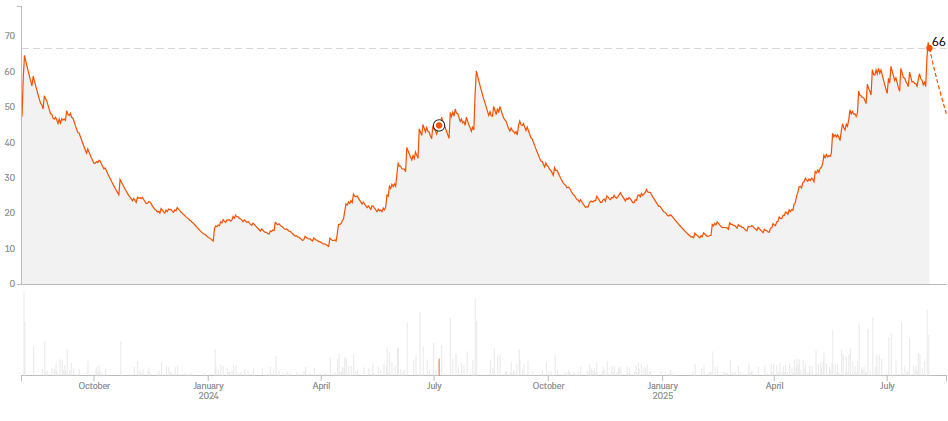This past weekend, I completed my seventh Pan-Mass Challenge, a two-day, 186 mile bike-a-thon across Massachusetts. As I reflected on the weekend on the Ferry ride back to Boston, exhausted but exhilarated, one thought hit me: I'm doing this the hard way.
The pattern has been embarrassingly predictable for years:
August: Peak fitness after 12 weeks of structured training
September: "Well-deserved" break
October-March: Complete radio silence
April: Panic and scramble to rebuild from scratch
Recovering on the couch Sunday night, I pulled up my fitness data from the past few years. The loss wasn't dramatic crashes. It was slow erosion. My baseline didn't collapse overnight. It quietly evaporated over months of doing nothing.
The data told the story clearly: I wasn't losing fitness in dramatic crashes. I was bleeding it away, month by month, through benign neglect. Yet here I was, year after year, voluntarily repeating the same slide. Einstein's definition of insanity in action: doing the same thing over and over and expecting different results.

24-Month Trend
The Maintenance Myth
Most people think maintenance means doing the same intense work forever. Wrong.
Smart performers discovered something counterintuitive: You need remarkably little effort to hold your gains.
Think about it: Once you learn to drive, you don't need driving lessons every week to stay proficient. A pianist doesn't need to practice scales eight hours daily to keep their muscle memory intact. A coder doesn't need to rebuild fundamental programming concepts from scratch each year.
The science backs this up across domains. People who take extended breaks, whether from languages, instruments, or physical skills, lose significant progress and spend most of their return journey regaining old ground. But those who maintain minimal, consistent practice continue improving over time.
While it takes 100% effort to build expertise, you only need about 30% to maintain it.
The framework is universal: brief breaks are fine, but extended abandonment is expensive. The math is brutal in the other direction: Lose your base, and you'll spend 3x more energy rebuilding than you would have spent maintaining.
The Minimum Effective Dose
Instead of the all-or-nothing approach, try this:
Identify your maintenance dose. What's the smallest consistent effort that prevents backsliding?
This is the kaizen principle: continuous improvement through small, sustainable steps rather than perfection-seeking heroics.
Examples:
Fitness: 3 workouts per week, 45 minutes each
Professional skills: Read one industry article per week, 30-minute skill practice
Relationships: Weekly check-in calls, monthly coffee dates
Mental health: 10-minute daily walk, weekly reflection
As James Clear writes in Atomic Habits: "reduce the scope, stick to the schedule." The goal isn't growth, it's preventing decay.
Even 1% better each day compounds into massive change over months and years. The smallest sustainable habit, done consistently, drives deep identity change and opens up bigger habits later.
Your Next Move
Pick one area where you're tired of starting over.
Ask yourself: "What's the minimum I need to do weekly to stay in the game?"
Then schedule it like a non-negotiable appointment.
You're not trying to be a hero. You're trying to be someone who doesn't have to start from scratch every time.
Avoid "all or nothing" thinking. If you can't do the perfect 60-minute session, do 10 minutes. Consistency is itself a selection mechanism, most people drop out, but doing the thing (even imperfectly) for an extended time produces results.
The Compound Effect
Here's the beautiful part: When you protect your base, everything else gets easier.
Next time you want to level up, you're launching from strength, not rebuilding from rubble. Your "comeback" becomes an upgrade, not a resurrection.
This principle echoes across performance domains. As Tim Ferriss notes in The 4-hr Work Week: consistency beats intensity every time. Phil Cavell in The Midlife Cyclist makes the same point; maintaining a base prevents the fitness cliff that derails so many athletes.
The Toyota Way teaches us that small, continuous improvements (kaizen) compound into breakthrough results. Your training environment matters too: surround yourself with people whose "normal Tuesday" looks like your best day.
That language you spent years learning? It doesn't have to fade into broken phrases.
That network you carefully cultivated? It doesn't have to go cold from neglect.
The question isn't whether you can rebuild it again.
It's whether you can finally stop demolishing what you've already constructed.
What's one thing you keep rebuilding that you could maintain instead?
P.S. If this resonated, you might enjoy Atomic Habits by James Clear. His core insight, "systems beat goals;" is exactly why maintenance trumps rebuilding every time. Get it here
Want more insights like this? Subscribe to Insight to Action for practical systems that turn scattered effort into sustainable progress.
Additional Resources:
🎧 Chasing Excellence: Scaling Back to Move Forward - How to maintain progress without burning out
🎥 David Brailsford – Aggregation of Marginal Gains - How British Cycling built sustained excellence through tiny improvements
📄 Dr. Rangan Chatterjee: Mini Summer Challenge - Breaking goals into sustainable 90-day sprints
Rank #1 on Amazon—Effortlessly with Micro-Influencers!
Ready to reach the #1 page on Amazon and skyrocket your recurring revenue? Stack Influence empowers brands like Magic Spoon, Unilever, and MaryRuth Organics to quickly achieve top Amazon rankings by automating thousands of micro-influencer collaborations each month. Simply send free products—no influencer fees, no negotiations—just genuine user-generated content driving external traffic to your Amazon listings.
Stack Influence's fully automated platform allows you to effortlessly scale influencer campaigns, improving organic search positioning and significantly boosting sales. Trusted by leading brands who've experienced up to 13X revenue increases in just two months, Stack Influence provides complete rights to all influencer-created content, letting you authentically amplify your brand.
Start scaling your brand today—claim the #1 spot on Amazon and multiply your revenue.
Recommended Reading
You don’t need more noise, but you do need the right signal. Here are four newsletters I trust for clarity, momentum, and meaningful growth. Each one earns its place in my inbox…now they can earn a spot in yours.







